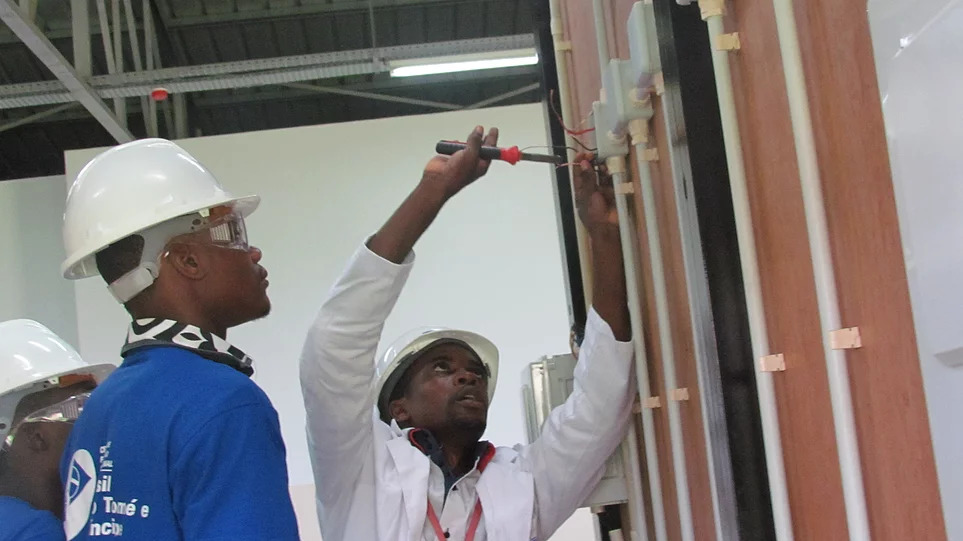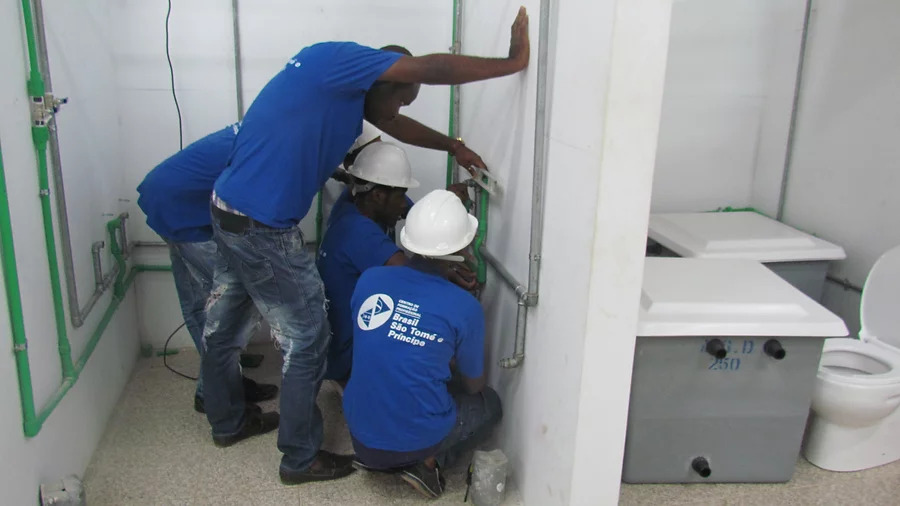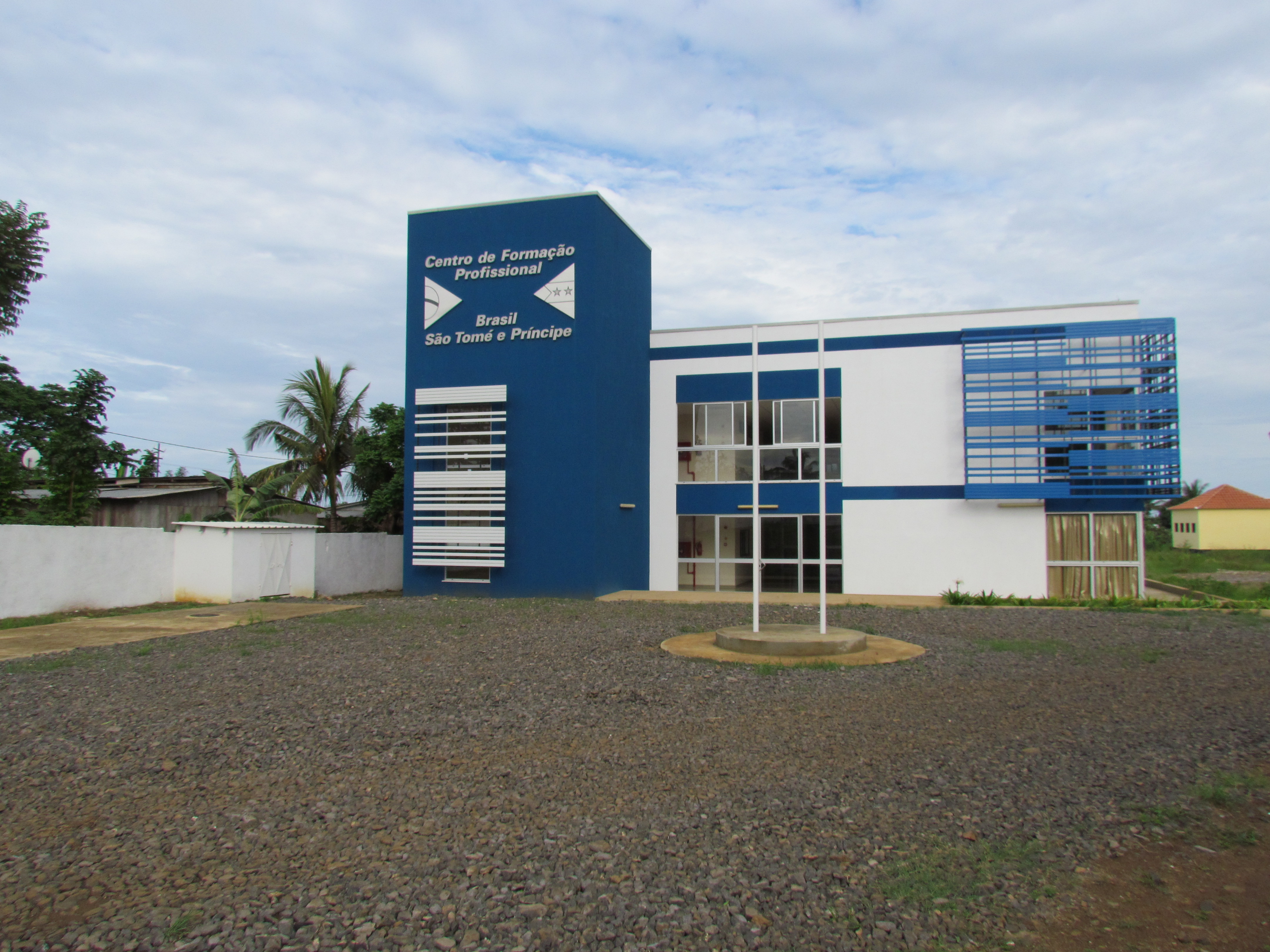 Establishment of the Brazil-São Tomé and Príncipe Professional-Training Centre
Addressing São Tomé and Príncipe’s demand for skilled labour through the provision of vocational training for youth and adults
Establishment of the Brazil-São Tomé and Príncipe Professional-Training Centre
Addressing São Tomé and Príncipe’s demand for skilled labour through the provision of vocational training for youth and adults

Challenges
Limited professional training in São Tomé and Príncipe contributes to the low qualification of the country’s working population and feeds a vicious circle between poverty and social inequality, undermining socioeconomic development. The total unemployment rate in the country is 14 percent, with a labour force participation rate of 60 percent (out of the total population aged 15-64). Vocational training could help increase the competitiveness of local companies and generate more jobs. To provide skilled labour for the service sector and nascent industries (mainly in civil construction), the national government has expressed interest in establishing a professional-training centre of reference, in which young people and adults can enhance their qualifications.
Towards a Solution
The establishment of the Brazil-São Tomé and Príncipe Professional-Training Centre (CFP BRA-STP) resulted from a partnership between São Tomé and Príncipe’s Ministry of Education, Culture and Science, the Brazilian Cooperation Agency (ABC) and Brazil’s National Service for Industrial Training (SENAI). The project aimed to contribute to the socioeconomic development of São Tomé and Príncipe by providing vocational education, including for young people seeking their first jobs. The project constructed a building to house the training centre in the capital São Tomé and formed its technical-pedagogical structure, which defined the training on offer, trained instructors and managers and provided didactic materials, furniture and equipment required for operation.
Capacity building sessions were conducted in São Tomé and Príncipe by SENAI’s instructors and part of the Sao Tome and Principe team that would work at the training centre received training at SENAI Pernambuco’s technical schools in areas covered by the courses. This human-capital capacity development helped with sustainability of the project by imparting knowledge that could be utilized in the management and design of future training courses. Not only did the government of São Tomé and Príncipe grant the land and build part of the training centre’s facilities, but it actively participated in definition of the courses in civil construction, electricity, metalwork, welding, automobile and motorcycle mechanics, food processing and information technology.
Inaugurated in 2014, the training centre has six classrooms (for up to 30 students each), a multipurpose room (for up to 60 students), three laboratories (information technology, hydraulics and food), five workshops (car mechanics, motorcycle mechanics, electricity, civil construction and welding), an auditorium (for up to 100 persons) and a library, in addition to administrative and support facilities. The training centre has the capacity to train up to 800 students per day. The project also included activities that sought to ensure the sustainability of the training centre, such as:
- formulation of a strategic plan;
- implementation of a shared-management structure (under the responsibility of the government); and
- establishment of evaluation and monitoring mechanisms.
Between 2014 and 2017, the centre trained more than 1,250 students. The success of this initiative led SENAI to be recognized by the United Nations as one of the three most important institutions fostering quality education in the Global South. Besides São Tomé and Príncipe, SENAI has also contributed, together with the ABC and national governments, to the establishment or restructuring of professional training centres in Angola, Cabo Verde, Guatemala, Guinea-Bissau, Jamaica, Paraguay, Peru and Timor-Leste.
Contact Information
Countries involved
Supported by
Implementing Entities
Project Status
Project Period
URL of the practice
Primary SDG
Secondary SDGs
Similar Solutions
| NAME OF SOLUTION | Countries | SDG | Project Status | |
|---|---|---|---|---|
Accelerating the Implementation of African Union Treaties in São Tomé and Príncipe South-South learning from the Beninese judicial system’s experience in the application of human rights treaties to its national law |
Brazil, Sao Tome and Principe | 05 - Gender Equality | Completed | View Details |
Accelerator Labs Network Following collective intelligence methods to address emerging sustainability challenges and the growing demand for local solutions |
Brazil, Sao Tome and Principe | 08 - Decent Work and Economic Growth 13 - Climate Action | Ongoing | View Details |
Accessibility of Financial Services and the Private Sector in Africa Maximizing the impact of financial cooperation on economic development and industrialization in Africa |
Brazil, Sao Tome and Principe | 08 - Decent Work and Economic Growth | Completed | View Details |
Accessibility ToolKit Promoting accessibility as a cornerstone for inclusive digital development in Bangladesh. |
Brazil, Sao Tome and Principe | 08 - Decent Work and Economic Growth | Completed | View Details |
ACP Business-friendly Supporting business-friendly and inclusive national and regional policies, and strengthening productive capabilities and value chains |
Brazil, Sao Tome and Principe | 08 - Decent Work and Economic Growth 17 - Partnerships for the Goals | Ongoing | View Details |



